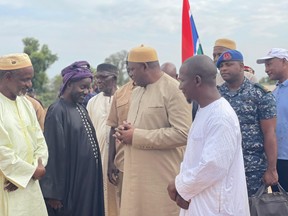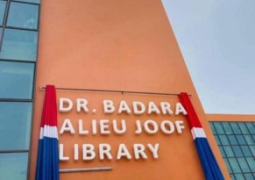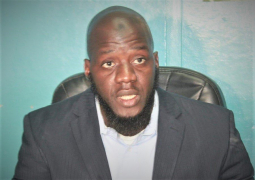
The Gambian leader was speaking on Wednesday when he made a significant stop at Jah Oil Company’s cement factory in Farafenni, where he was warmly received by senior executives and staff. The visit, part of the president’s ongoing engagement with key national stakeholders, underscored his administration’s commitment to fostering public–private partnerships aimed at achieving food self-sufficiency and ending rice importation.
“We are spending significant resources on rice importation, which poses a challenge,” Barrow said. “Mechanisation is the way forward.”
Reflecting on the global impact of the COVID-19 pandemic, Barrow stressed the importance of domestic food production. “When the pandemic disrupted supply chains, rice prices soared and the cost of living spiked. We are doing everything possible to prevent such vulnerabilities in the future,” he stated.
The president called on Gambians to take the lead in agricultural transformation, assuring them of his government’s full support.
Momodou Hydara, Managing Director of Jah Oil Company, expressed gratitude to President Barrow for the visit, describing it as a clear demonstration of the government’s continued support for the private sector in the collective pursuit of national development.
“This visit affirms your government’s unwavering commitment to partnering with private enterprises in our shared goal of building the nation,” Hydara said.
During the tour, led by Jah Oil CEO Hamidou Jah, the president was shown newly acquired heavy machinery intended to accelerate the company’s rice self-sufficiency drive. Hydara highlighted several initiatives Jah Oil is undertaking across the country, including large-scale farming operations and mechanisation efforts.
“Right now, we are harvesting,” Hydara stated. “The Minister is aware of our constraints, and we’ve received considerable support with equipment. However, many of the machines we deployed to farms began malfunctioning simultaneously, forcing us to seek additional government assistance.”
He revealed that Jah Oil had to invest an additional $2.7 million to procure new equipment to maintain momentum and meet their five-year target for food independence.
Hydara credited President Barrow’s industrialisation policy, introduced between 2022 and 2023, as the catalyst for the company’s expansion efforts.
“Thanks to your visionary leadership, we have been able to expand operations in Farafenni and Bafuloto, and we’re injecting capital into Bayaba farms to meet our goals within a short timeframe,” he said.
Hydara also outlined the company’s dry season strategy, which includes cultivating 100 hectares each of onions, potatoes, and maize to support both food security and the animal feed industry. “With mechanisation, we aim to clear and prepare more land to maximise production and complement government efforts to achieve food self-sufficiency,” he added.
Minister for Agriculture Demba Sabally echoed the president’s sentiments, reaffirming the government’s commitment to supporting rice growers and private sector partners in achieving rice self-sufficiency by 2030.
Visit to Jah Oil Cement Factory
Officials said once the cement factory is completed in November, the project will strengthen the country’s manufacturing base and enhance regional economic activity. It will also boost domestic production, reduce import dependence, create jobs, and support national infrastructure development.
Farafenni General Hospital
As part of his various project site visits, the Gambian leader and his delegation also toured the Maternity Ward at Farafenni General Hospital, which is currently under construction with funding from the Fatoumatta Bah Barrow Foundation. According to officials, once completed, the ward is expected to enhance the quality of healthcare service delivery in the area.
Visit to Africa 50 at TransGambia Bridge Company Complex
The president also visited the Africa 50 at the TransGambia Bridge Company office, which is being developed in Bereto and will be completed by the end of year. Once completed, the new office complex will enhance the company’s capacity to manage and maintain critical transport infrastructure efficiently. It will also strengthen oversight of bridge operations, improve logistics, and support the long-term sustainability of one of the country’s most vital regional transport links.
Daru Mbayen Meeting
During a community meeting in Daru Mbayen, several speakers addressed President Barrow with heartfelt appeals and reflections on the region’s development needs.
Alhagie Mbaye, the village Alkalo, urged the President to extend electricity to their community, noting that many neighbouring villages are already benefitting from it. He also appealed for the establishment of a clinic, explaining that the nearest hospital is six kilometres away.
“Pregnant women often travel by donkey cart for treatment, and some have even given birth en route. A local clinic would greatly alleviate this hardship.” He further requested milling machines, highlighting the difficulties women face. “Children often take their grains to distant mills and return late, which poses safety concerns,” he said.
Demba Sey, speaking on behalf of the District Chief, called on the community to avoid anything that could cause division, particularly tribalism. He emphasised the importance of unity for the district’s progress.
Matarr Touray, representing the youth, appealed to the President for the establishment of skills centres to empower young people in the area.
Sainey Jawara, a National Assembly Member, reflected on the long-standing contributions of the community. He noted that since 1965, residents have paid taxes with minimal development in return.
However, he acknowledged the rapid progress made over the past nine years, citing improvements in roads, schools, hospitals, and the establishment of skills centres in CRR North. He praised the widespread availability of boreholes in Lower Saloum, providing clean potable water, and highlighted the skills centre in Wassu, where youth across CRR North and South are beneficiaries.
Minister of Agriculture, Demba Sabally, highlighted the various projects and support initiatives that the government has introduced to farming communities in the area. He claimed that these efforts demonstrate the Barrow administration’s unwavering commitment to the agricultural sector and its dedication to addressing the concerns of farmers.
He also urged residents of the area to participate in the IEC voter registration process and to support the President in the 2026 presidential election.
Minister for Lands, Hamat Bah, echoed similar sentiments, adding: “In order for us to continue witnessing rapid development, it is important that we register during the voter registration exercise and vote for President Barrow.”
President Adama Barrow, in his address, thanked the people of the three districts for their massive turnout. He assured them of continued development in the region, stating, “I am your servant, and whatever you need, I will do it for you. I want to leave a lasting legacy here.”
He called for unity to achieve the nation’s developmental aspirations. The President announced that road construction will soon commence in Farafenni and surrounding villages. He also shared that the government had undertaken numerous feasibility studies in CRR, with road projects set to begin across the country.





